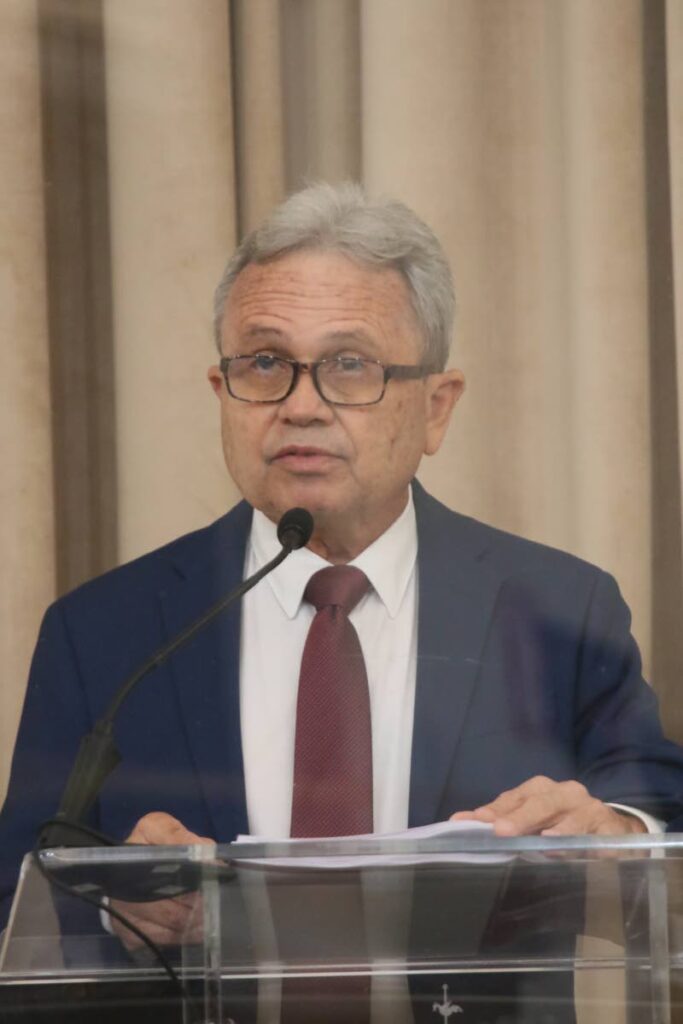Imbert: Government didn't budget for high fuel subsidy

FINANCE Minister Colm Imbert has said subsidising fuel with oil at its current rate would cost Trinidad and Tobago $3 billion – and that was a cost that government simply didn’t budget for.
Imbert made the statements during an interview with TTT, in which he explained the issues surrounding the price of fuel and the fuel subsidy, and why the subsidy was reduced.
“At this point in time, with oil at US$95, or if you use an average price of US$95, the cost of premium gasoline would be over $7/litre, or $7.25. The cost of super would be about $7.05. The cost of diesel would be $6.50 or $6.70.
“Let’s say the average is TT$8. With our annual consumption of a billion barrels of gasoline, that means the country has to pay TT$8 billion to purchase fuel. At the prices (prior to the increase) the revenue that would have been generated would have been about TT$5 billion.
"So the remainder that would have to be made up by government would be about TT$3 billion. Someone has to pay that extra $3 billion.”
He said the bulk of the supposed $3 billion deficit would have come from the treasury, which holds money from VAT, income tax, corporation tax and all the government's other revenue sources.
He added that government allocated $200 million to subsidise the price of fuel in the 2021-2022 budget. That was calculated from an oil price of about US$65 a barrel. But the price is now much higher.
“So the subsidy has to be paid to maintain prices (at previous levels) is an expense that was not budgeted for.”
He knocked criticism of the reduction of the fuel subsidy and described comparisons with places such as Barbados and Guyana as false. He added that the arguments that these countries are reducing taxes and increasing subsidies in separate countries are irrelevant to the point that TT would have to find billions of dollars to maintain the subsidies at previous levels.
“What is relevant is, where are you finding $2 billion or $3 billion to make up the difference between the cost of purchasing the fuel and the price at which you sell it?
"None of the commentators are saying where they would get that from. Are they going to increase VAT? Are they going increase the income tax rate? Are they going to reduce personal allowance? Are they going to increase duties on imported goods? Where will they get the money from?
"They (commentators) don’t want to treat with the reality that there is a $2-$3 billion deficit that has to come from somewhere.”
Imbert said government took the decision to reduce the fuel subsidy in such a way that some of that expenditure could be applied to other things.
“We could put it into development programmes, patching potholes, fixing roads, cleaning drains, making sure that there isn’t any flooding in the oncoming rainy season, on the health sector, free education or tertiary education.
"We don’t think that it is a good idea to take $2 billion or $3 billion and spend it on keeping the fuel prices down. It should be spent on something that is of a much better benefit to the nation.”
Imbert said the price of fuel is determined by several factors. This includes the purchase price of the oil at the world market price, plus the price of processing that oil into gasoline, plus the cost of logistics, transport, storage and other overheads. He said TT normally buys its fuel from the US.
Imbert explained that the fuel subsidy started in the 70s when an Arab/Israeli conflict triggered what was dubbed by many the first oil crisis in history.
The conflict, the Yom Kippur War, started in 1973, when Egypt and Syria launched a surprise attack against Israel on the Jewish day of Yom Kippur (atonement). But when the tide turned and Israel began gaining ground, Arab oil-producing countries tried to pressure Western countries into forcing Israel to withdraw, by placing embargoes on the US, Netherlands, Portugal, Rhodesia and South Africa.
In December 1973 the Organisation of the Petroleum Exporting Countries (OPEC) held a conference in Vienna where it was announced that the price of oil, which was about US$5 a barrel, would go up to US$11.65 a barrel because of the cessation of oil exports to these countries. In response to the rising price of oil and the correlated price of fuel, Prime Minister Dr Eric Williams put the fuel subsidy in place.
But Imbert noted that in 2014 the then government spent close to $7 billion to maintain the same fuel subsidy.
He said that government was afraid of the backlash that would come from reducing the subsidy and decided to maintain it. That was a bad move in the long run, he said.
“Can you imagine if the government at the time decided to put aside TT$2 billion for the fuel subsidy and had the other TT$5 billion? They could have paid all the back pay to public servants and not left it for an incoming government to deal with as an expense to burden the treasury. There are many different things that the money could have been used for.”
On April 19, the price of super and premium gasoline increased by $1 per litre to $6.75 and $5.97 respectively. Diesel went up 50 cents to $3.91 and kerosene went up to $3.50.


Comments
"Imbert: Government didn’t budget for high fuel subsidy"